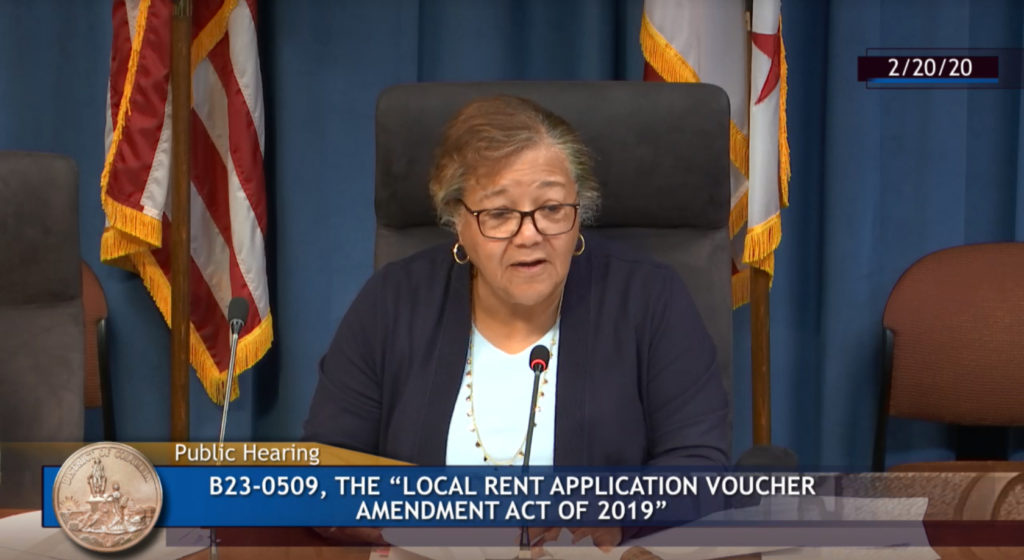At a Feb. 20 hearing, the D.C. Council examined legislation that some see as an incremental step in addressing housing discrimination. The Committee on Housing and Neighborhood Revitalization heard testimony on the Local Rent Application Voucher Amendment Act of 2019 and the Rental Housing Source of Income Amendment Act of 2019, two bills introduced last fall that critics say are more symbolic than effective.
The Local Rent Application bill, if approved and funded, would provide recipients of housing vouchers with the money to cover fees associated with up to five apartment applications, including background checks and credit checks. The Source of Income bill underscores existing law, stating it is illegal for landlords to deny housing to a potential tenant based on their use of vouchers or similar housing assistance to pay the rent.
More than a decade ago, “source of income” was added as a protected class under the District’s robust Human Rights Act. However, according to a recent Urban Institute report, 15% of D.C. landlords still will not rent to voucher holders. Despite current federal and local laws, experts say, the issue of housing discrimination persists due to the District government’s poor enforcement and some landlords’ lack of respect for existing requirements.
[Watch: Committee on Housing & Neighborhood Revitalization, Public Hearing, Anita Bonds, Chairperson]
“Unfortunately, some landlords or housing providers and property managers have ignored the law,” Councilmember Anita Bonds said at the hearing for the two bills, both of which she backs. “This legislation will clarify to such bad-actor housing providers that their actions will not be tolerated in the District and that all people who are able to pay for rent — no matter what source of income they list — are eligible and must be considered.”
The proposals come at a time when District officials have taken steps to address what advocates say is a long-standing sense of impunity some landlords have exploited. A 2010 report produced by the nonprofit Equal Rights Center found that 45% of voucher holders at the time experienced income discrimination. Not much has changed in the past decade. The center is currently funded by the U.S. Department of Housing and Urban Development to combat housing discrimination via various techniques, including a free online course to help tenants and landlords alike understand what constitutes discrimination. The nonprofit has documented the extensive use of digital ads with discriminatory language and has filed complaints with the D.C. Office of Human Rights. A Street Sense Media analysis of all Craigslist advertisements for apartment rentals in D.C. on a single day in 2018 found that 8% of listings explicitly said vouchers were not accepted.
Last year, D.C. Attorney General Karl Racine expanded his office to include a new Civil Rights Section. A press release explaining the expansion focused on housing discrimination against low-income tenants along with “a spike in hate crimes in the District that have targeted the LGBTQ community, immigrants, and other vulnerable populations.” In conjunction with the new initiative, Racine’s office announced a lawsuit against Curtis Investment Group Inc. in response to the company’s use of discriminatory ads and alleged unwillingness to consider voucher holders as potential tenants. That suit was settled last month, with Racine’s office securing a $900,000 penalty for the company.
[Read More: Public hearing raises questions about civil rights enforcement]
Meanwhile, D.C. Council members have proposed several bills that promise stronger anti-discrimination measures. But speakers at last month’s hearing said the two under discussion wouldn’t actually remove the obstacles that prevent low-income residents from becoming tenants.
“We don’t think these bills … close any loopholes in the law,” said Catherine Cone, an attorney at the Washington Lawyers’ Committee for Civil Rights and Urban Affairs. “I don’t think these bills serve a helpful purpose. [The legislation] doesn’t do any harm, but it doesn’t provide more protection. The thing we think would be much more helpful for the council to do is to set a hearing for the Fair Tenant Screening Act.”
Cone said she appreciates the intent of the new bills but sees more promise elsewhere.
The Fair Tenant Screening Act of 2019, introduced by Ward 8 Councilmember Trayon White the day before the hearing, would prohibit housing providers from inquiring about a prospective tenant’s sources of income and credit history. Bonds, who chairs the Committee on Housing and Neighborhood Revitalization, joined Vincent Gray and David Grosso as the bill’s co-sponsors.
According to the D.C. Housing Authority, over 11,000 local households depend on the federal Housing Choice Voucher Program that it manages. Housing discrimination is pervasive in the District and can be formidable for those who depend on the federal voucher system, even preventing some from getting off the streets, according to a DCHA spokesperson.
The Local Rent Application bill offers to pay for up to five rental applications but does not address what is a bigger obstacle for many voucher holders: the landlords’ requirement for a credit check.
“I pay all my rent and utilities,” Nicole Odom, a voucher recipient with Empower D.C., said at the hearing. “Why am I treated differently when the only difference is that I made a sacrifice to go to school? Every time they check my credit, it’s a hit on my credit score, and they have no plans of even approving me.”
Cone said a working group is putting the best features of all the relevant bills together — including the Fair Tenant Screening Act and the Eviction Record Sealing Act of 2019 — into a single piece of omnibus legislation. Members of the working group will press for a hearing and markup once the new bill is introduced.
This article was co-published with TheDCLine.org.








